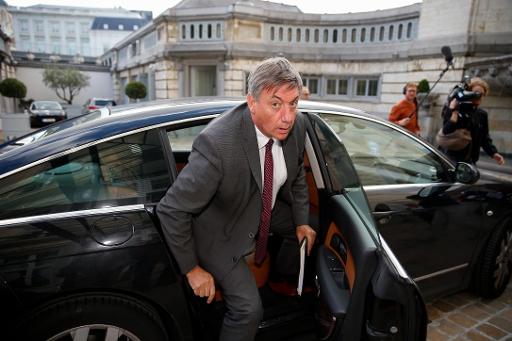Flanders has a new regional government, party leaders announced Monday as they emerged from a marathon 21-hour of negotiations which they said yielded a "solid" coalition agreement.
"We have an agreement," lead negotiator Jan Jambon, likely to become the region's Minister-President, tweeted early on Monday, adding that the agreement was made up of a "solid package of measures for a strong Flanders."
In line with reports ahead of the final negotiations sprint at the weekend, the new Flemish government will be led by the same three-party coalition of the previous legislature but will see slight shifts in the distribution of ministerial portfolios.
The right-wing, nationalist Nieuw Vlaamse Alliantie (N-VA), of which former federal minister Jambon is a member, will lead the majority coalition with liberal Open Vld and Flemish Christian-democratic CD&V.
Parties took a total of 127 days to reach an agreement, marking a new record for the longest period of formation in Flanders, with negotiations stalled by the potential entry of the Vlaams Belang (VB) into a majority coalition, after the far-right party surged in the May ballot to become the second-largest party in Flanders, after the N-VA.
Reacting to the news on Twitter, VB chairman Tom Van Grieken said the new government completely denied the election results, calling the new coalition "everything the voter didn't want!"
Related News
- Flanders poised to unveil new government as negotiations enter final stages
- Flemish Parliament reopens without traditional Government statement
Balanced budget, rain check on climate?
The coalition will hold 70 seats out of the parliament's 124, with the rest occupied by the opposition, led by the far-right Vlaams Belang (VB), and the Flemish socialists (sp.a) and greens (Groen).
"We have a strong agreement," CD&V negotiator Hilde Crevits said, according to De Standaard, with party colleague Wouter Beke saying the agreement met the "three basic principles" prioritised by their party.
Speaking for the Open Vld, negotiator and party chairwoman Gwendolyn Rutten said that the lengthy nature of the talks meant that "important things" had been gone over on which negotiators prioritised "listening to each other."
In a press conference slated for noon, representatives of the coalition are expected to detail their government agreement, which media reports say signals a tighter approach to issues like immigration, spending and education, at the same time as they note a backslide on measures regarding climate and environmental issues.
A measure which would see immigrants who failed an "integration exam" fined was dropped during the negotiations, according to De Morgen, but an intention to tighten the overall criteria for those applying for residency was maintained.
As they scrapped plans for tax hikes, a measure which is expected to see the budget deficit increase, parties agreed to work to achieve a balanced budget by 2021, moving forward the original 2023 date set to reach their budget goals.
The drop of a smart kilometre charge by the negotiators —a measure which would see drivers taxed in accordance with the number of kilometres travelled, among other criteria— could pose a barrier to its implementation in other regions, after Brussels authorities said they wanted to work jointly with Flanders for its implementation.
Measures to push for improved energy efficiency in homes or to reduce traffic congestion were also dropped or absent from the final agreement, raising questions about the new government's action on climate and environmental issues.
Gabriela Galindo
The Brussels Times

